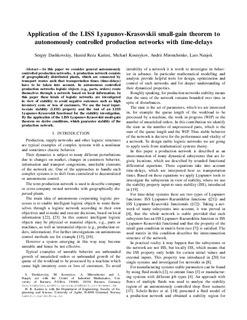Application of the LISS Lyapunov-Krasovskii small-gain theorem to autonomously controlled production networks with time-delays
Original version
Dashkovskiy, S., Karimi, H. R., Kosmykov, M., Mironchenko, A., & Naujok, L. (2010). Application of the LISS Lyapunov-Krasovskii small-gain theorem to autonomously controlled production networks with time-delays Conference on Control and Fault-Tolerant Systems (pp. 765-770): IEEEAbstract
In this paper we consider general autonomously controlled production networks. A production network consists of geographically distributed plants, which are connected by transport routes such that transportation times (time-delays) have to be taken into account. In autonomous controlled production networks logistic objects (e.g., parts, orders) route themselves through a network based on local information. In this paper these kinds of logistic networks are investigated in view of stability to avoid negative outcomes such as high inventory costs or loss of customers. We use the local inputto- state stability (LISS) property and the tool of an LISS Lyapunov-Krasovskii functional for the stability investigation. By the application of the LISS Lyapunov-Krasovskii small-gain theorem we derive conditions, which guarantee stability of the production network.
Description
Accepted version of a paper published by IEEE. (c) 2010 IEEE. Personal use of this material is permitted. Permission from IEEE must be obtained for all other users, including reprinting/ republishing this material for advertising or promotional purposes, creating new collective works for resale or redistribution to servers or lists, or reuse of any copyrighted components of this work in other works Published version: http://dx.doi.org/10.1109/SYSTOL.2010.5676085
